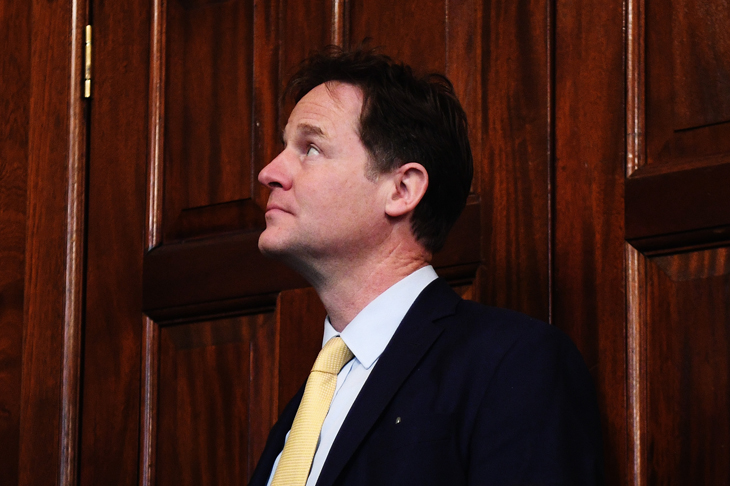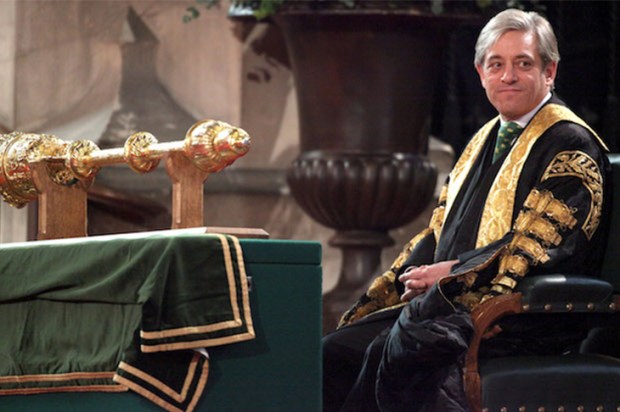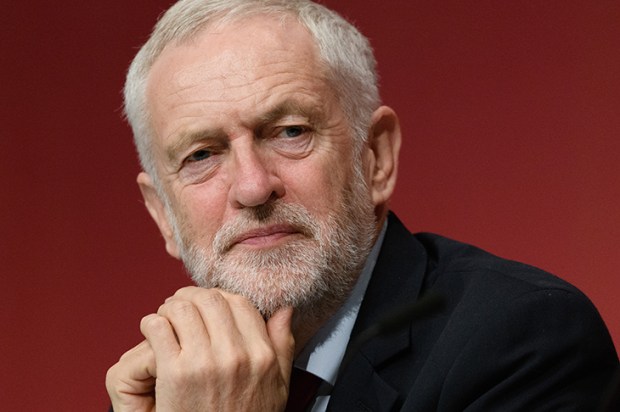As I write, the sneering at Nick Clegg has started. The first cuckoo I’ve heard in this chorus is calling from the left. Last week Nesrine Malik in the Guardian launched a scornful attack on Mr Clegg’s decision to quit public life in Britain and join Facebook in America. ‘Thanks for nothing,’ she says.
I feel sad about the paper Ms Malik writes for. The Guardian took an historic wrong-turning when in 2010 it decided not to be interested in the possibilities for centre/-centre–left co-operation. These days the paper often sounds like the voice of the Labour left: rasping and angry rather than the open-minded and inquisitive liberal voice it once was. Malik and her fellow Guardian columnist Gary Younge last week removed themselves from the nominations for this year’s Comment Awards on the grounds that they didn’t want to be on the same list as my Times colleague Melanie Phillips. This is the first time I’ve seen ‘no-platforming’ invading mainstream Fleet Street and it’s a baleful development. Am I to stop writing for The Spectator on the grounds that I don’t want to appear between the same covers as (say) Rod Liddle or James Delingpole? But I love being in the same magazine as these nincompoops, offering readers (as I suppose) respite. One has a civic duty as a columnist to show readers there is a better world.
But this column’s purpose is to lament the fate of men and women in public life today who have tried to steer a middle course, only to be mocked — or, worse, savaged — by the extremes of left and right in our new century. Malik accused Clegg of ‘quite simply fleeing the scene’. She complains about those who, on quitting politics, seek work outside politics that is well-rewarded. Her targets all seem to be centrists. She concludes that ‘Clegg’s decamping is a good reminder of what landed us with Brexit in the first place — the recklessness of politicians for whom the stakes are very different’.
This is wholly unjust. You could level the criticism (though I would not) at Jacob Rees-Mogg, whose well-remunerated work in wealth management (you might complain) insulates him from the consequences of Brexit for poorer folk. But I don’t believe Mr Rees-Mogg is careless of the poor; he probably believes the Brexit project would make everyone richer. And Clegg used his time as deputy prime minister to lift the poor out of taxation; most of his efforts were directed towards the less advantaged; then when Brexit loomed he worked tirelessly for Remain, for precisely the reason that it would hurt those less wealthy than himself. His decision now to seek work elsewhere reflects nothing about his personal compassion. It reflects his conclusion that no useful place for him in British politics is available, and that his energies will be wasted. He has made an entirely practical choice.
Malik is described by her own newspaper as ‘a former private equity investor’. What is she saying, then? That Clegg organised his own career progression in the wrong order?
But we could guess at Clegg’s or Malik’s inner motivations until the cows come home. Instead, I start from Clegg’s conclusion that there is no political future for him and his abilities in today’s Britain. I take that as a fact. If you know a way he could get back into politics, tell me — or, rather, tell him.
I know only that at a critical time, in the wake of the economic crisis of 2008, when after an inconclusive general election international confidence in Britain’s ability to get itself a proper government could have collapsed, Clegg took the risk of leading a reluctant party into a difficult coalition. I hope Malik was cheering him on. For Britain (and in the event, David Cameron) it proved a lifesaver. For Clegg and his party it was a disaster.
As a man he paid a devastating price. Sniped at throughout in the most personal terms, denounced as a traitor and turncoat, as two-faced, as a liar and a quisling, excoriated by the Tory right as the obstacle to their purist ideological plans, undermined by Tim Farron and Vince Cable in his own party, and scorned by the Labour left as a Tory collaborator, Clegg would have needed the hide of a rhinoceros for it not to hurt. He lacks the hide of a rhinoceros and it did hurt. But he soldiered on until, widely rejected within his party, his constituents kicked him out. So now, still young, he’s looking for a new career. Can you blame him?
He’ll be fine. It isn’t his personal political homelessness for which we need to weep, but the new unfashionability of moderates in politics with the courage to compromise. Centrists have so much to be proud of in the years since Margaret Thatcher came to power. Labour could have died without Tony Blair. ‘New’ Labour might never have gained traction without the brave defections of Roy Jenkins, Shirley Williams and David Owen. As for Mrs Thatcher’s achievements in office, where would she have been without William Whitelaw, Peter Walker, Jim Prior, Peter Carrington or Francis Pym, gently steering her away from the rocks? Who could have brought the Tories election victory in 1992 but John Major? Where would Britain be without the work of Michael Heseltine or Chris Patten?
These are the men and women and this is the thinking that kept me and countless others in the Conservative party. If I were 18 today — indeed if any of them were 18 — would we be attracted to the Tories as our natural party? I hear Conservative voices — sour, harsh or angrily uncompromising, sometimes on these pages — whose whole tone is calculated to push people away. And the same is true of the left.
Well, they’ve pushed Nick Clegg away. ‘Thanks for nothing’? Thanks for so much. But off he trudges, heading west. There will be a sense of ‘good riddance’ among some of my colleagues in Conservative journalism. They could not be more wrong.
Got something to add? Join the discussion and comment below.
Get 10 issues for just $10
Subscribe to The Spectator Australia today for the next 10 magazine issues, plus full online access, for just $10.
You might disagree with half of it, but you’ll enjoy reading all of it. Try your first month for free, then just $2 a week for the remainder of your first year.















Comments
Don't miss out
Join the conversation with other Spectator Australia readers. Subscribe to leave a comment.
SUBSCRIBEAlready a subscriber? Log in